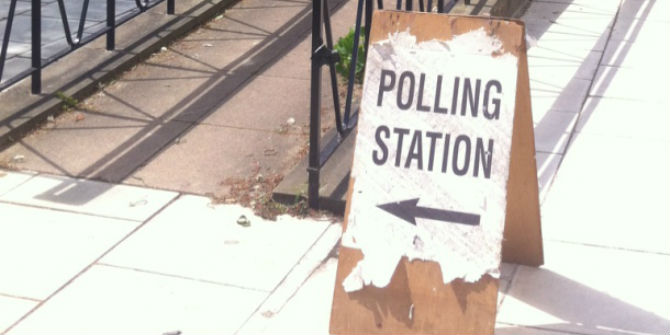

 Two years on from the Brexit vote, the benefits of a second referendum are being hotly debated. Jess Sargeant, Alan Renwick and Meg Russell (Constitution Unit) identify seven questions that should be considered before parliament decides whether a second Brexit referendum will take place.
Two years on from the Brexit vote, the benefits of a second referendum are being hotly debated. Jess Sargeant, Alan Renwick and Meg Russell (Constitution Unit) identify seven questions that should be considered before parliament decides whether a second Brexit referendum will take place.
A recent Sky poll suggested that 50% of the public would favour a three-way referendum on the UK’s future relationship with the EU. This follows calls from key figures including Justine Greening, Dominic Grieve, and Tony Blair, as well as a campaign launched by The Independent for the public to be allowed a vote on the final deal. Number 10 has categorically rejected these calls, stating that there will be no further referendum on Brexit ‘in any circumstances’. Nonetheless, talk of a second referendum is likely to continue. Whether you are a supporter or an opponent of that proposal, there are some big important questions about the practicalities of such a referendum that need to be explored. This post sets out some of the most crucial questions.

1. Would it be possible to hold a referendum in the time available?
To hold a referendum in the UK, parliament must first pass primary legislation, which clearly takes time. To complicate matters, during the bill’s passage through parliament, the Electoral Commission must assess the ‘intelligibility’ of the proposed referendum question – which usually takes ten weeks. There are then other key steps after the bill has received royal assent. The Electoral Commission and the local authorities that must run the poll need sufficient time to prepare. Campaigners on both sides must be designated, and the current legislative framework – the Political Parties, Elections and Referendums Act 2000 (PPERA) – sets out a ten-week regulated campaign period.
The time taken to go through these steps in actual referendums has varied. The legislation for the 2016 EU referendum was introduced 13 months before polling day. For the 2011 AV referendum, this was nine and a half months, with only 11 weeks between royal assent and the poll. If the UK is to leave the EU on 29 March 2019 (exit day), such long timescales clearly are not feasible. A big question is therefore, in the current exceptional circumstances, whether the time needed for each step can be compressed – and if so, by how much and with what consequences? For a new referendum to have public legitimacy, these are crucial questions demanding careful answers.
2. Is extending Article 50 feasible?
Even if the timetable can be compressed, it seems likely that the UK would need to request an extension of the two-year Article 50 window to enable a referendum to take place. To postpone exit day beyond 29 March 2019, all of the other 27 EU member states would need to agree to such an extension. Reports have suggested that this is likely to be possible if the reason for extension were to hold a referendum, but this would not be without its difficulties.
One obvious problem is that European Parliament elections are due to take place at the end of May 2019. If the UK were still a member at this point, a question would quickly arise regarding what should happen to its seats in the Parliament. Either the terms of existing MEPs would need to be extended, the UK would need to temporarily be a member without seats, or the UK would need to hold fresh elections. None of these would be legally straightforward, and new elections could become a kind of ‘proxy referendum’, used by voters to express an opinion on Brexit.
There are also potential problems surrounding the EU budget that would need to be considered if Article 50 were to be extended. These issues would be pivotal for whether the EU was willing to do so, and if so for how long.
3. How could a referendum be triggered?
If a second referendum became government policy, the government would introduce a bill to enable it to happen. This would be passed provided a majority in parliament was in favour.
The potential also exists to trigger a referendum against the government’s wishes. Parliament will vote at least twice on the withdrawal deal: on the ‘meaningful vote’ motion to approve the deal and future framework; and on the Withdrawal and Implementation Bill, which will give the deal effect. If there was sufficient support amongst MPs for a second referendum, amendments requiring one could be added at either of these points. It is unlikely that all of the necessary legal framework could be set out adequately in a backbench amendment, so the government would then need to table its own extensive amendments or bring forward additional referendum legislation.
The questions here are deeply political. Are there any circumstances in which the government might drop its opposition to a referendum? In what circumstances might a House of Commons majority support one? What kind of referendum might win approval? Above all, this leads on to the next question, on what the options in the referendum could be.
4. What might the options be?
A key point emphasised by the Independent Commission on Referendums, which reported last month, was the importance of having clear, well-developed options in referendums.
In the case of a second Brexit referendum three options look most likely as candidates to be put to the voters: the deal the government has negotiated; leaving the EU without a deal; or remaining in the EU.
It would be possible to achieve clarity on the withdrawal deal – if one can be reached. But voters are likely to want clarity on the UK’s future relationship with the EU as well, and this may remain very undeveloped. For a ‘Remain’ option to be clear, assurances from the EU that the UK could remain on the same terms as before would be needed. The biggest question is who would be responsible for outlining what would happen should the electorate vote for a ‘no deal’ option. The Independent Commission recommended that the government should set out detailed proposals for any poll, as it will be responsible for implementing them – but in this case some might doubt the government’s good faith in doing so. There is arguably a fourth option of reopening negotiations, but this is likely to be too vague to be acceptable.
5. What form should the question take?
Various proposals have been made for the nature of the question put to voters in the event of a second referendum. One option would be to hold a simple Yes/No referendum asking voters whether they accept the government’s deal. However, voters who felt the deal was ‘too hard’ and those who thought it ‘too soft’ would both vote No; consequently if voters rejected the deal, it would be very unclear what should happen next.
Alternatively, a binary referendum between any combination of two of the three proposed options could be held. While voters might benefit from a familiar referendum format, excluding any of the options could be politically difficult, or be perceived as an attempt to manipulate the process.
Recently, Justine Greening proposed a three-option referendum. This may allow voters to express their preferences more clearly, but there are further issues to consider, notably the voting system. Using First Past the Post would risk an inconclusive result; a preferential voting system, as Greening proposed, would solve this problem but could also create anomalies of its own.
Another option that has been suggested by Dominic Grieve and Vernon Bogdanor is to hold a two-question referendum. These questions could be asked at the same time, as in the 1997 Scottish devolution referendum, or asked separately, with a period of time in between. Grieve and Bogdanor propose different orderings and combinations of options. Again, potential difficulties need to be considered: any such proposal could make it difficult for voters to express their true preferences, and could encourage ‘gaming’.
There may be no perfect approach that would allow all voters to express their preferences and guarantee an unambiguous result. The advantages and disadvantages of each approach need to be carefully considered and weighed up.
6. What should the legislation contain?
As well as setting out the question, the legislation enabling a new referendum would also need to specify the franchise and any amendments or improvements to the regulatory framework.
Many proponents of a second referendum advocate extending the vote to 16- and 17-year-olds. But doing so would raise questions of legitimacy: if the result of the first referendum were reversed because the franchise had been changed for the second referendum, that would hardly be likely to command respect among Leave supporters. Registering these new voters would also take time.
The last referendum raised serious concerns about the UK’s current regulatory framework for referendums – particularly relating to the role of government in the campaign and the weakness of the rules on digital campaigning. The Independent Commission on Referendums made detailed recommendations regarding what needs to change. Consideration would need to be given as to which such changes were feasible in the time available.
7. What are the alternatives?
Holding a second referendum on Brexit would be fraught with difficulties and added complexities. But other paths to concluding the Brexit process entail very big challenges of their own. The numbers in the House of Commons are so finely balanced that it is possible that parliamentary deadlock could be reached. This is worsened by the fact that if parliament makes the final decisions – no matter what option it endorses – it may well face accusations that it has disregarded public opinion. Public support for a particular outcome could be sought through a general election rather than a referendum, but that would also be fraught with difficulties. Hence there is no easy way out of the current situation, and even if a referendum is difficult, it may ultimately be reached for as a solution.
Despite the current positions of both the government and the official opposition, a second referendum is clearly possible. It is therefore imperative that the questions raised here are explored in detail.
This post represents the views of the authors and not those of the Brexit blog, nor the LSE. It first appeared at the Constitution Unit blog.
Jess Sargeant is a Research Assistant at the Constitution Unit.
Alan Renwick is Deputy Director of the Constitution Unit.







we cannot have a vote on the final deal, as there is no final deal, only the agreement of a frame work to work towards a deal. We have had a referendum, we need to implement the result of it. would you propose a third referendum if the result of a second referendum still does not go your way?
Omg
This comments box will overflow with the usual points, so let’s get it in quickly.
Best of three???
Parliament can’t make their minds up on how to cook an egg!! How would they ever ever agree wording for options?
House of Lords would have a great time burying this idea, burying would. be a good thing for House of Lords
Why not publish the white paper on withdrawals? And we can study that for the next three years!
If and I say if we leavers/great unwashed didn’t know what we voted for, what chances of the great and mighty parliamentarians ensuring this time we know everything?
Tiny Blair??? ( not an accident spelling )
You cannot be serious that anyone takes that man seriously!
He knows what side his bread is buttered, him and his side kick mandelson!
Those calling for second referendum should get out of parliament, they failto recognise that the electorate have given them instructions to take us out. It is not their job to question us, they need reminding that they are our servants not our masters.
Fortunately we can use our vote to remove them and their party by democratic means. Unlike the leaders of the Europe union.”!!!!
spot on dennis.. again.
Justine Greening’s three way referendum presents a biased solution. By providing the three options of
1) The Governments Brexit deal
2) Leave without a deal
3) Remain in the EU
the referendum splits the Leave vote and immediately weakens Leaves chances of winning. You might have a situation where more voters voted to leave ( the total of option 1 and 2 ) than voted to Remain (option 3), but if the winner is the option with the most votes there is a chance that the minority win the day. Then we go through another round of arguing about how unfair the referendum was and when are we going to have a third referendum.
To balance the referendum you would have to include a realistic second Remain option. But that is open to abuse and controversy as it would have to be an option that a fair portion of Remain voters would vote for. Otherwise it would be seen as a deliberate non-runner to channel Remain votes into option 3. What could the fourth option be? Remain and join the Euro?
– Clutching at straws… about time you all just accepted it, and worked for the common good.
Surely it would be possible to hold a referendum under the terms of the existing EU Act (2011).
And then another and another and and and!!!!
If we did hold a second one that went narrowly to stay
Then we can use the same arguments for the third. Fifth, Seventh.
Where does it end as long as the referendums are an odd number we could go on for ever.
Maybe we should have a referendum about whether we should have a referendum.
This is akin to Corbin thinking he won the snap election!
I know!!!
I’m being stupid and ridiculous!
But remainers started it!!!!
Personally, I don’t think there is anything to fear from a second referendum. A recent survey showed that 60% of the population don’t care if they are in or out of the EU. They just want it to be sorted. If they vote Leave in a second referendum then it is sorted otherwise the issue will run and run.
Also the British people are very fair-minded and a portion of those who voted Remain will not vote Remain a second time because they believe the first vote should be respected.
If there is a second referendum then my judgement is that the majority for Leave would be sufficiently large that they would not be able to call any further referendum for at least ‘a generation’.
“Best of three”
No you aren’t thinking it through. ‘ Leave’ are 1-0 up, but we are told that isn’t sufficient. If they win again then it is generally acknowledged that it would be a case of ‘game set and match’. So it is a bit like tennis you have to be two points up to win. If Remain wins the second referendum, then we would need at least two more further referendums until one side is two wins ahead of the other.
… nah. best of 5.
– 70/30 majority to hold it over (no excuse for rewhining)
– remainers pay for reruns until this majority is reached (they didnt accept the 1st result- i did , so why should i pay?)
– 16,141,241 remainers- 9 million quids worth of brochures through every uk letterbox- divvy it up.
– remainers tax code adjusted to reflect reruns- remainers property held until fully paid up the incurred bill.
– job done.
The authors have not addressed an important issue. In order for a second referendum to have a greater legitimacy than the first, then the turnout needs to be higher for the second election. Possibilities are making polling day a national holiday or voting on a Sunday. Making voting compulsory, as in some countries, ;probably wouldn’t be acceptable.
Hell why not have another vote or two for that matter and then we have ‘best of three’ better still let’s adopt Strictly’ come dancing’s super democratic voting procedure and have a vote every week and parliament can have a vote and we will add them together.? That’s democracy isn’t it ?